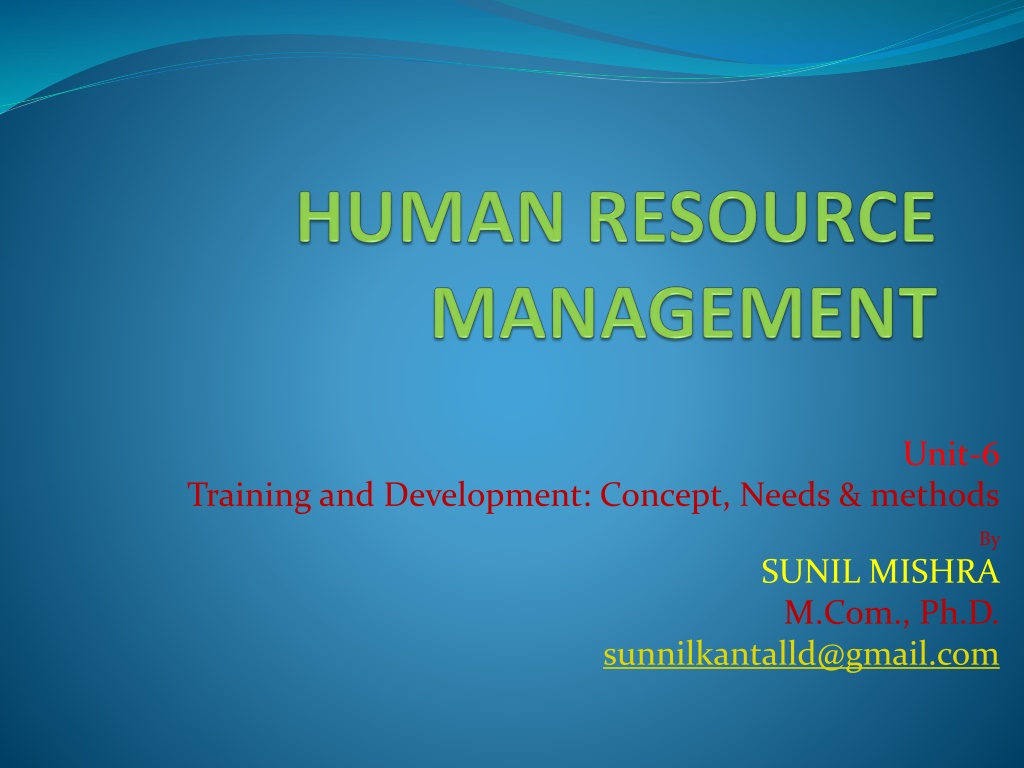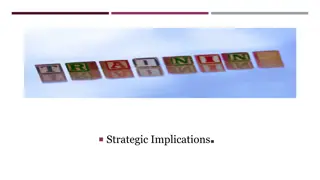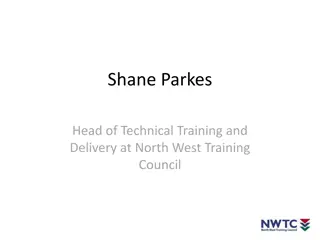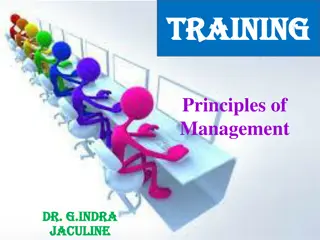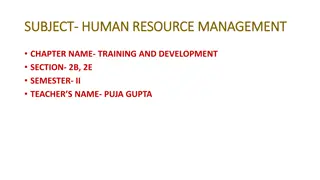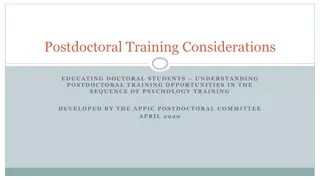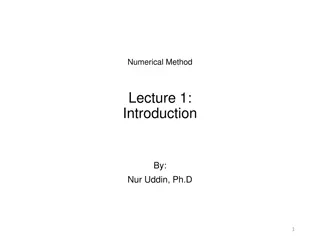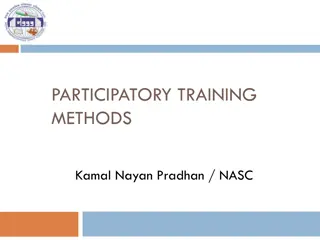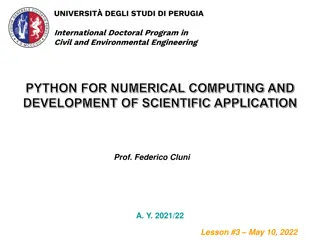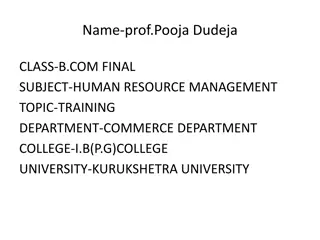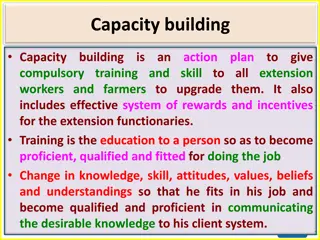Training and Development Concepts: Methods and Importance
Training and development are vital for employee growth and organizational success. Education, training, and development processes are outlined, emphasizing the significance of continuous learning. The methods of training, including on-the-job and off-the-job approaches, are discussed alongside the importance of equipping individuals with the skills and knowledge needed for job performance and personal growth.
Download Presentation

Please find below an Image/Link to download the presentation.
The content on the website is provided AS IS for your information and personal use only. It may not be sold, licensed, or shared on other websites without obtaining consent from the author. Download presentation by click this link. If you encounter any issues during the download, it is possible that the publisher has removed the file from their server.
E N D
Presentation Transcript
Unit-6 Training and Development: Concept, Needs & methods By SUNIL MISHRA M.Com., Ph.D. sunnilkantalld@gmail.com
Toward Development :Attracting & retaining HR Education Training Development What is Education : Understanding and interpretation of knowledge Developing logical and rational mind Helps in understanding phenomena Inculcating Character and Grooming of personality
TRAINING Process of learning a sequence and programmed behaviour Application of knowledge Awareness of the rules and procedures to guide people Improvement in employees performance Prepare employees for intended job In All TRAINING there is some EDUCATION In All EDUCATION there is some TRAINING
DEVELOPMENT It It It is intended to equip person to earn promotion or higher responsibility. is a related some process. change. bring It covers not only those activities which improves job performance but also those which bring growth of the personality, help individuals in the progress towards maturity and actualization of their potential capacities so that they become not only good employees but also better men/ women.
TRAINING T- Talent & Tenacity R- Reinforcement A- Awareness I- Interest N- Novelties I- Intensity N- Nurturing G- Grip
Meaning of training It is a planned effort to facilitate employees learning of job related behaviours in order to improve employee performance. Improvement in skills Better performance of employees Given to Manager and Non-Manager Required for New and old employees Improve Human and Conceptual skills of Managers Improve Technical skills of Non-managers
Methods of Training On-the-Job Off-the-Job Training Methods Training methods
ON THE JOB TRAINING METHODS Job Rotation Apprenticeship Internship Brainstorming Delegation of work to subordinates Coaching Learner Training Temporary promotion Demonstration and example Guidance and counseling Simulation Informal Training
OFF-THE-JOB TRAINING METHODS Lecture-cum-demonstration Conference Case study Role playing Sensitivity training Transactional Analysis Management Games Workshop Vestibule Training institute
Difference On-the-Job training Off-the-Job training It is provided at work place. It is provided by superiors to their subordinates. It is less costly. It is less time consuming. It is used where job are simple. It disturbs work schedule. It is suitable where number of employees to be trained is less. It is provided out off work place It provided by experts within or outside the organisation. It is costly method of training. It is more time consuming. It is used where jobs are complex. It does not disturb work schedule. It is suitable where number of employees to be trained is more.
Management Development A manager is a dynamic life giving element in a business entity but it is not shown in any statement of an enterprise. The skill and calibre of corporate manpower never appear in any balance sheet but it is widely acknowledged throughout the world that the greatest asset of a company is trained manpower. Palkiwala, Nani A. (1994): We the nation The managerial staff should be given proper attention for the success of every enterprises. Any organization can t expect proper growth and attaining objectives without the growth and development of managerial staff. An institution that can t produce its own managers will die.
Concept of Management Development Management development is a systematic process of improving the performance of existing managers and to provide for a planned growth of managers to meet future organizational requirement. Thus, any process which intends to improve the performance effectiveness and preparing the managers for future higher responsibility through education and Development. Executive and Management Development activities are used inter changeably. Management Development is a systematic process of training and growth individuals gain and apply knowledge, skills, insight and attitudes to manage work organization effectively . Dale. S. Beach training is Management
Management Development is a systematic process of training and development by which manager gain and apply knowledge, skills, abilities to perform his duties effectively and ready to accept the new challenges. All development is self-development. Of course, any company creates only the favorable atmosphere of the development of personnel by investing money and hiring training faculties. The success or failure of any MDP largely depends upon the individual approach and self development becomes the key- factor to this. Inspite of the attribute of self development, the two other attributes can t be ignored. First, development programme should recognize individual differences and second, development programme should be long range process and thus, a manager can t be produced over night. Therefore, management development is a guided self- development.
Scope of Management Development Scientific selection of right people in the management cadre; Placement of properly selected people on the right job; and Assurance that these properly placed managers could grow as per expectations and could meet both the need of the organization as well as their own needs.
Objectives of Management Development The primary objectives of management development are to improve and develop overall managerial capabilities to deal with the complexities of business environment and enable them to shoulder the higher responsibilities. There can be various set of objectives of management development in an organization for-top, middle and lower level personnel. Management development is meant for change through a process of planned learning. The change must occur in the some crucial areas which are given below: Change in knowledge Change in attitudes Change in behavior Change in performance Change in operational result These changes depend upon the trainee s personal interest and motivation to learn and his actual learning efforts. Management development activities help to achieve the desired level of change through systematic and planned efforts.
Objectives of Top Level Management To improve thought processes and of analytical ability in order to uncover and examine problems and take decisions in the best interest of the country, To broaden the outlook of the executive in regard to his role, position and responsibilities in the organization and outside, To think through problems which may confront the organization now or in the future, To understand economic, technical and institutional forces in order to solve business problems and To acquire knowledge about the problems of human relations.
Objectives of Middle Level Management To establish a clear picture of executive functions and responsibilities, To bring about an awareness of the board aspects of management problems and an acquaintance with and appreciation of, inter- departmental relations, To develop the ability to analyze problems and to take appropriate action, To develop familiarity with the managerial uses of financial accounting, psychology, business statistics, To include knowledge of human motivation and human relationship and To develop responsible leadership.
Objectives of Lower Level Management To increase knowledge of business functions and operations in specified fields in marketing production, finance and personnel, To increase proficiency in management techniques (e.g. work study, in inventory control, operation research and quality control), To stimulate creative thinking in order to improve and procedures, To understand the functions performed in a company, To understand human relation problems and To develop the ability to analyse problems in one s areas of functions.
Concept and Classification of Managerial Skills Management Development is a continuous process of improving the performance of managerial personnel to accomplish the organizational objectives as well as individual satisfaction and development. To perform better, they must have certain required level of knowledge, skills, positive attitude towards work in the shortest possible time. Therefore, management development is a learning process to improve skills, knowledge and attitude of managers. Management development is not only to perform better but also to keep ahead of current responsibilities, so as to prepare them for higher tasks and challenges.
Types of Skills Technical skills. Human skills. Conceptual skills. Social skills.
Technical Skills Technical skills are those that enable a manager to use techniques, methods, processes and equipments effectively in performing specific jobs. These skills are developed through experience Operating managers must have knowledge that How things work? Most of the vocational and on the job training programmes are largely concerned with developing technical skills. Technical skills imply an understanding of and proficiency in a specific kind of activity particularly one involving methods, processes, procedures or techniques organization. Managers at the lower levels must understand the mechanics of their jobs if they are to supervise their subordinates effectively. and education. in every type of
Human Skills Human skills include sensitivity training, human resource training, group dynamism, effective leadership. It refers to the ability to work effectively with others on a person-to- person basis and to build up co-operative group in relation to accomplish the organizational goals. Such skills include the ability to communicate, motivate and to lead. These skills require a good understanding of human psychology, in other words an understanding of why different individuals react to the same situation differently. Human skills concerned with people . A person with highly developed human skills work to create an atmosphere of approval and security in which subordinates feel free to express themselves without fear of censure or ridicule, by encouraging them to participate in the planning and carrying out of those things which directly affect them.
Conceptual Skills Conceptual skills are those which make possible to a manager to consider an enterprises as a whole and evaluate the relationships which exist between various parts of functions of a business. Such skills are concerned with the realm of ideas and creativity. It is a combination of vision, imagination and intelligence that assures perspective in viewing and organization and its future. It is an understanding that how a change in one part affect another and its extend to the relationship of individual business firm to whole industry and economy, to outsider and society and also to the government. The effective coordination of the various parts of the business and the future direction of the organization depend on the conceptual skills of the managers. The higher one raises in the management hierarchy the greater the need of conceptual skills.
Social Skills Today s business entities occupy a significant place in the society. Like an individual citizen, enterprises are also expected to be good citizen protecting the interest of society as well as the country. Traditional objectives of profit making by either means of enterprises is abominated by today s social responsibilities of business organization. Therefore, business must contribute to people s happiness, his freedoms and his material, mental, moral and spiritual well being. Since business as social institutes owes certain responsibilities to society, management decision can t be indifferent to the wider social implications. Social skills are a ability to understand this concept. Social responsibility of business implied the responsibility of every business to itself, to its customers, workers, share holders, community and the state and the mutual responsibility of these to one another. It is a task of management to reconcile this separate and sometimes conflicting responsibility. Like a citizen, business is esteemed and judged by its actions in relation to the community of which it is a part. Gupta pointed out that two new and connected instrument is needed if the company is to discharge its social responsibilities10. They are the public meetings and social audit. Therefore, social skills recognized the workers right to a fair wages, a right to participate in decisions affecting their working life, to welfare, to collective bargaining, to security. Management should give the opportunity to the workers to educate, trained and to develop himself to greatest possible limits.
